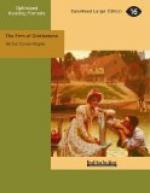The member in question was a broad-shouldered, bull-necked young man, who leaned against the marble mantel-piece, turning over the pages of an almanac, and taking from time to time a stealthy peep over the top of it at the toilers around him. Command was imprinted in every line of his strong, square-set face and erect, powerful frame. Above the medium size, with a vast spread of shoulder, a broad aggressive jaw, and bright bold glance, his whole pose and expression spoke of resolution pushed to the verge of obstinacy. There was something classical in the regular olive-tinted features and black, crisp, curling hair fitting tightly to the well-rounded head. Yet, though classical, there was an absence of spirituality. It was rather the profile of one of those Roman emperors, splendid in its animal strength, but lacking those subtle softnesses of eye and mouth which speak of an inner life. The heavy gold chain across the waistcoat and the bright stone which blazed upon the finger were the natural complement of the sensuous lip and curving chin. Such was Ezra, only child of John Girdlestone, and heir to the whole of his vast business. Little wonder that those who had an eye to the future bent over their ledgers and worked with a vigour calculated to attract the attention of the junior partner, and to impress him with a due sense of their enthusiastic regard for the interests of the firm.
It was speedily apparent, however, that the young gentleman’s estimate of their services was not entirely based upon their present performance. With his eyes still fixed upon the almanac and a sardonic smile upon his dark face, he uttered a single word—
“Parker!”
A flaxen-haired clerk, perched at the further end of the high glistening desk, gave a violent start, and looked up with a scared face.
“Well, Parker, who won?” asked the junior partner.
“Won, sir!” the youth stammered.
“Yes, who won?” repeated his employer.
“I hardly understand you, sir,” the clerk said, growing very red and confused.
“Oh yes, you do, Parker,” young Girdlestone remarked, tapping his almanac sharply with the paper-knife. “You were playing odd man out with Robson and Perkins when I came in from lunch. As I presume you were at it all the time I was away, I have a natural curiosity to know who won.”
The three unhappy clerks fixed their eyes upon their ledgers to avoid the sarcastic gaze of their employer. He went on in the same quiet tones—
“You gentlemen draw about thirty shillings a week from the firm. I believe I am right in my figures, Mr. Gilray?” addressing the senior clerk seated at the high solitary desk apart from the others. “Yes, I thought so. Now, odd man out is, no doubt, a very harmless and fascinating game, but you can hardly expect us to encourage it so far as to pay so much an hour for the privilege of having it played in our counting-house. I shall therefore recommend my father to deduct five shillings from the sum which each of you will receive upon Saturday. That will cover the time which you have devoted to your own amusements during the week.”




